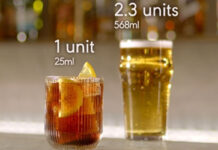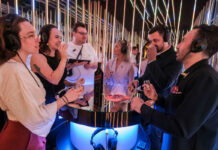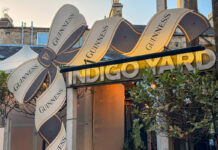The ‘premiumisation’ trend is likely to return, but education is the key to trading up

THE ‘premiumisation’ of the on-trade – with customers willing to trade up to more ‘top-shelf’ products – had been a well-established trend by the beginning of last year.
And now that customers are once again able to venture into Scotland’s bars, pubs and restaurants, the premium end of the gantry is predicted to be as popular as ever.
“Consumers want to indulge when given the opportunity, and this is expected to continue, or be of even more importance, now outlets have reopened,” said Severine Hemms of Nestle Waters, parent company of soft drink and mixers brand Sanpellegrino.
And quoting figures from Kantar Insights Faith Holland, head of category development at Diageo, said 46% of customers “agree that it’s worth paying more for quality drinks in the on-trade”, with separate CGA figures stating that, prior to the first lockdown in 2020, premium spirits accounted for one in three serves in bars and “we expect to see their popularity continue in the coming months as people celebrate missed occasions with friends and family and create memorable moments”.
“In order to make the most of a premium spirit offering and encourage trade-up, venues need to consider the ways in which they can deliver on providing high quality serves and drinking experiences for guests,” said Holland.
Premium spirits are said to have performed well across the board in recent years, but Holland recommended licensees pay particular attention to the gin category, which continues to prove popular with pub and bar customers.
The label of ‘premium’ is, of course, up for debate, with no strict definition of exactly what constitutes a premium spirit.
Indy Anand, director of rum importer Skylark Spirits, said it’s up to customers to decide which products represent best value to them.
Anand said education “is key for the customer, so they can decide what is value to them and then decide if a spirit is worth the price”.
“If they believe the longer a product is aged, the more valuable it is, then they can make that decision,” said Anand. “Or if the size of a distillery making the product and how much effort they have to go through in their production is worth more value.
“Giving the customer the information is much more important so they can decide what is most valuable in the spirit they choose.”
And while customers are able to access plenty of information on brands online – and may have done so over the past year – ultimately it is bar staff that are able to really make the difference in selling the unique story of a spirit.
“Bar staff are the first point of contact for a customer,” said Anand.
“If they are trained well, they become brand/spirit ambassadors and will be able to help customers learn and understand value in what they drink.
“Highly educated bar staff are an absolute must and will not only build relationships to retain customers, but expand customer bases as their knowledge is appreciated and shared by those customers to their friends.”























